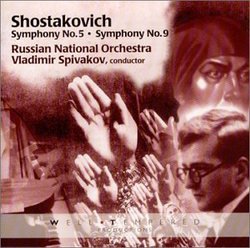| All Artists: Dmitry Shostakovich, Vladimir Spivakov, Russian National Orchestra Title: Shostakovich: Symphonies 5 & 9 Members Wishing: 0 Total Copies: 0 Label: Well-Tempered Produc Release Date: 2/27/2001 Genre: Classical Styles: Historical Periods, Modern, 20th, & 21st Century, Symphonies Number of Discs: 1 SwapaCD Credits: 1 UPC: 755425519025 |
Search - Dmitry Shostakovich, Vladimir Spivakov, Russian National Orchestra :: Shostakovich: Symphonies 5 & 9
 | Dmitry Shostakovich, Vladimir Spivakov, Russian National Orchestra Shostakovich: Symphonies 5 & 9 Genre: Classical
These two symphonies are a study in contrasts: one long, tragic, weighty, reaching for the depths and heights of emotion; the other short, sarcastic, insouciant, almost frivolous, shot through with desperate, black humor. ... more » |
Larger Image |
CD Details
Synopsis
Amazon.com
These two symphonies are a study in contrasts: one long, tragic, weighty, reaching for the depths and heights of emotion; the other short, sarcastic, insouciant, almost frivolous, shot through with desperate, black humor. Together, they give a multidimensional picture of Shostakovich's multifaceted genius and his way of overcoming and sublimating his physical, psychological, and political afflictions. It has been asserted that nobody can play a Shostakovich symphony the way a Russian orchestra can. That bold statement can be tested by comparing this recording with another of the same two symphonies by the New York Philharmonic under Leonard Bernstein. The Russian National Orchestra, now celebrating its 10th anniversary, was founded by Mikhail Pletnev. Vladimir Spivakov, who is also the founder and director of the Moscow Virtuosi, became its music director in 1999. This is their first recording together. A renowned violinist famous for his virtuosity and his gorgeously rich, pure, silken tone, Spivakov fosters and cultivates these qualities in his orchestras. The performances here, captured live, are excellent, but the recorded sound is a bit shrill and the dynamic contrasts are excessive. The style is dignified, elegant, emotionally restrained; only in the Finale of the Ninth do the musicians let themselves go. Bernstein's approach is exactly the opposite. The slow movements are slower, the fast ones faster; the sound is darker, warmer, more transparent; the Russians hold back, the New Yorkers go to the emotional edge, from dagger-sharp irony to heart-rending lamentations; the Russians sound smooth and refined, the New Yorkers earthy, shrill, passionate, wild. Of course, Shostakovich's No. 5 is one of his most Mahler-influenced symphonies, and Bernstein, a great Mahler conductor, points up their kinship. Clearly, Shostakovich's symphonies are open to many valid interpretations. Like all great music, they transcend national boundaries. --Edith Eisler
Similar CDs
| MC Eiht Tha8t'z Gangsta Genres: Pop, Rap & Hip-Hop, R&B Label: Half Ounce (Bayside) | |

 Track Listings (9) - Disc #1
Track Listings (9) - Disc #1